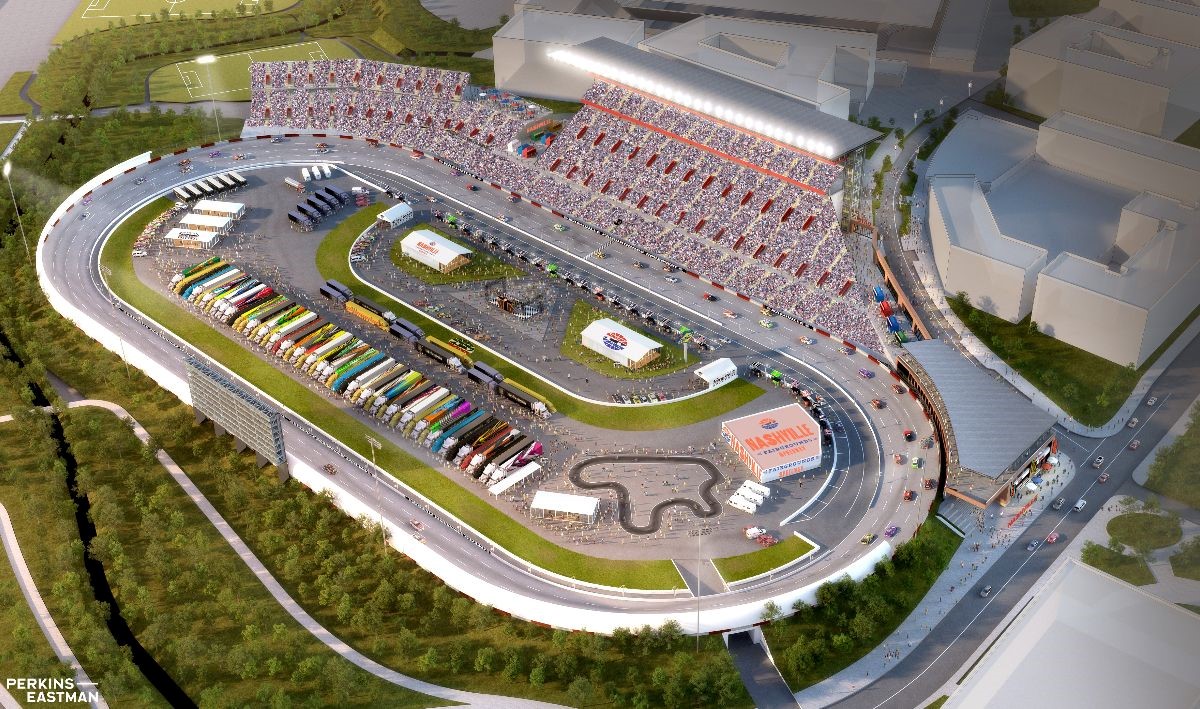NASCAR: Nashville Fairgrounds Speedway plans to reduce noise with Sound Walls
A sound engineering firm on Wednesday evening presented the Metro Fair Board with a plan to cut noise levels by half at a renovated Nashville speedway by using sound walls like you see alongside Interstate Highways everywhere.
The presentation addressed concerns about increased noise around the Nashville Fairgrounds Speedway if proposed lease and development agreements between Metro and Bristol Motor Speedway are approved and the racetrack is restored.

The primary noise reducer? A 20-foot high sound-absorbing wall surrounding the speedway, said Jack Wrightson, a principal with Texas-based Wrightson, Johnson, Haddon, Williams.
“What we are trying to do is create a better situation in the community than what exists currently,” Wrightson said. “We think that we have some mitigation measures that allow that to happen in a significant way.”
It’s been just over a year since Nashville Mayor John Cooper’s office reached a preliminary agreement with Bristol Motor Speedway to overhaul Nashville Fairgrounds Speedway — a move leaders hope will bring a NASCAR Cup race back to the city. Wrightson’s presentation Wednesday included previously announced limits on the number of races, a curfew for start and stop times, a new grandstand building that seats 30,000 spectators, and other new facilities.
“All these things act as barriers to noise,” Wrightson said. “But the most important barrier is a combination of a grandstand and what Bristol is committed to doing, a continuous wall around the racetrack that basically connects unbroken from one edge of the grandstand to the other.”
Bristol Motor Speedway hired the firm after receiving a list of recommended companies from Fair board Chair Sheri Weiner.
Wrightson and Bristol Motor Speedway officials said muffler enforcement on race cars is another critical component of the noise absorption plan.
How would a sound wall work at Nashville Fairgrounds Speedway?
The proposed sound wall would force noise to travel “a much longer distance” to go over the wall and “down to the residents,” Wrightson said. Fair board members asked if the wall would also reduce noise for proposed concerts, dirt bike races and monster truck events. Wrightson said the wall would work for other events, but the level of sound reduction would depend on which direction a musical act faced, while also keeping the current 10 p.m. curfew.
Bristol Motor Speedway president and general manager Jerry Caldwell previously said his company has worked with 25 nearby neighborhood and community organizations as it developed the plan. Many of the groups expressed concerns about the noise level that would be created by a renovated facility.
Board member Todd Hartley echoed those sentiments.
“This is the No. 1 thing we heard from the community was that there are concerns about noise,” Hartley said.
The proposed renovation, pending approval by the Fair board, Metro Sports Authority and Metro Council, would enter Bristol Motor Speedway into a long term contract to lease, manage and maintain Nashville Fairgrounds Speedway.
Who’s paying for project?
The proposed lease would be for 30 years. The project would be funded by an up-front contribution of $17 million from the state of Tennessee and a $17 million contribution from the Nashville Convention & Visitors Corp. Metro Sports Authority would issue 30-year revenue bonds to finance the renovation.
Revenue streams for debt service and facility maintenance would include rent payments, taxes paid by venue patrons, sponsorship agreements and event revenue.
Speedway Motors Sports Inc., the parent company of BMS, owns 11 NASCAR Cup Series tracks, including Nashville Superspeedway in Lebanon, home of the Ally 400 NASCAR Cup Series race.
Proposed noise mitigation measures
The following are noise reduction measures proposed by engineering firm Wrightson, Johnson, Haddon, Williams:
• A new grandstand and track buildings.
• A new surrounding sound-absorbing wall.
• Mandated muffler use for all non-NASCAR racing.
• Limiting the facility to 10 race weekends per year.
• A limit of one NASCAR weekend per year as part of the 10 race weekends.
• A curfew on event start and stop times. Nashville Tennessean
